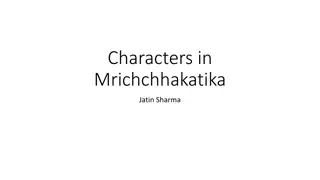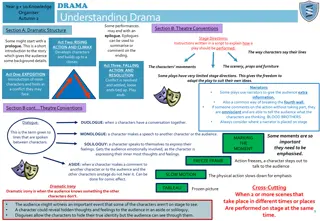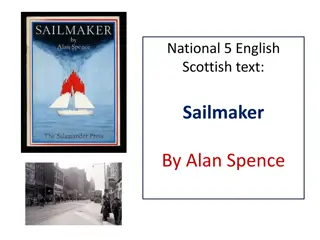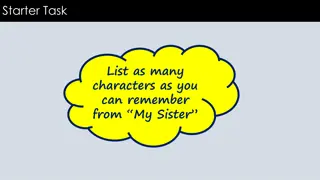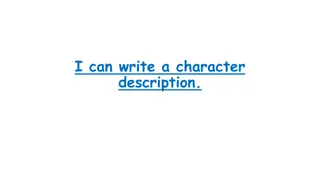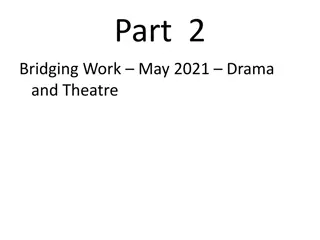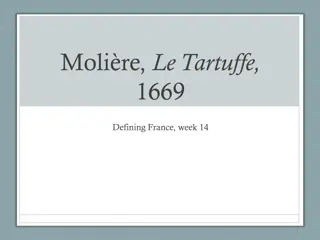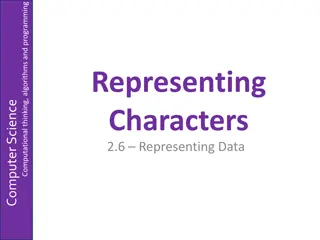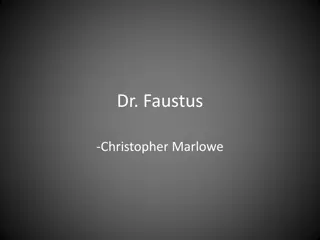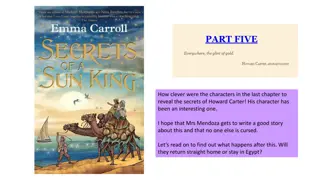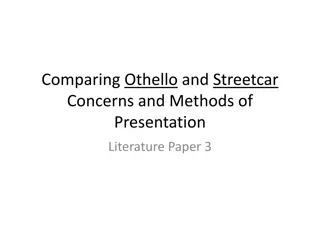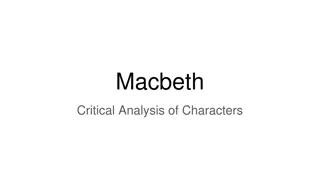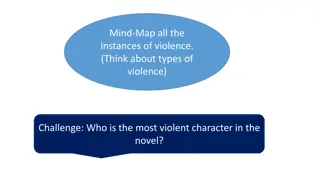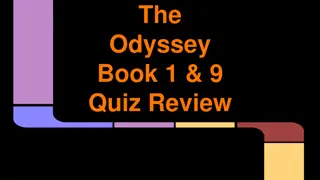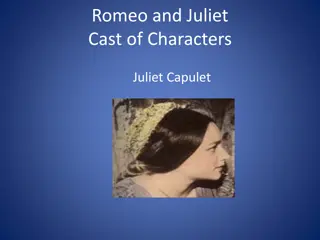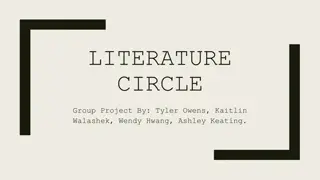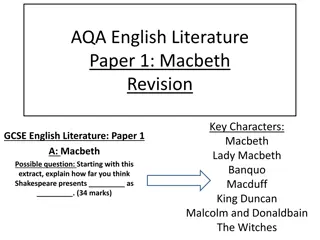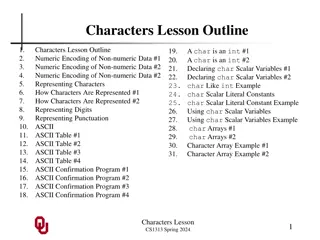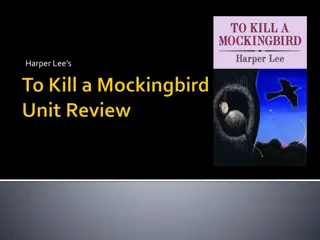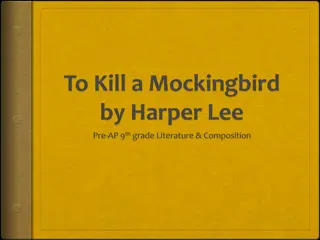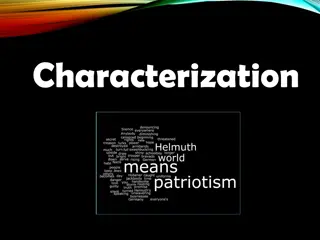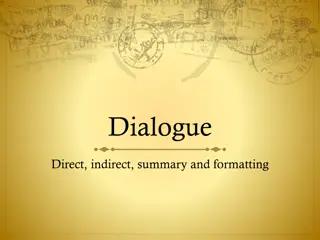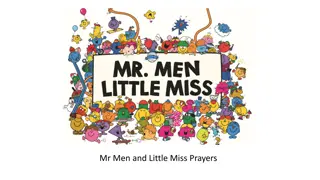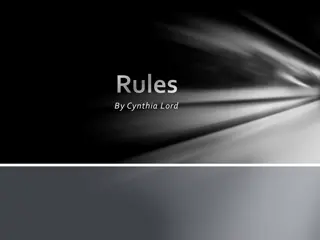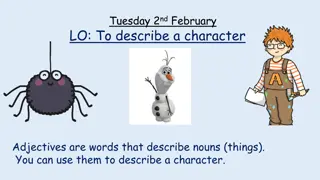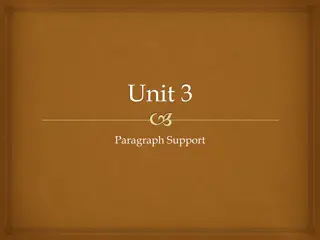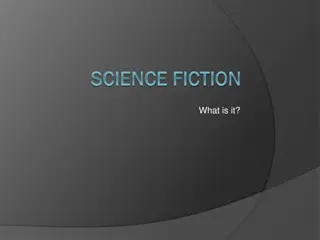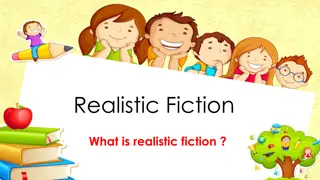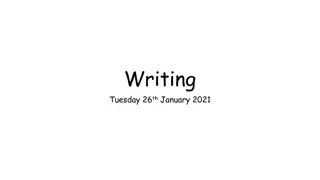Foreshadowing
Foreshadowing is a literary technique where authors use hints or clues to suggest future events in a story. It builds suspense, engages readers, and makes the narrative more believable. Analyzing foreshadowing involves looking for clues in dialogue and descriptions to predict what might happen next.
0 views • 8 slides
Characters in Mrichchhakatika
The play Mrichchhakatika features a diverse cast of characters including the narrator, Sutradhar, and his wife Nati, the hero Charudatta who is a Brahman merchant in financial distress, the courtesan Vasantasena who loves Charudatta, the villain Sakara, and various other associates, officers, and re
0 views • 6 slides
Theater Conventions and Characterization in Drama
Theater conventions such as prologues, epilogues, dialogues, monologues, and dramatic structure like exposition, rising action, climax, falling action, and resolution are explored in drama. Additionally, the importance of character creation through techniques like backstories, flashbacks, and flashf
0 views • 4 slides
Exploring "Sailmaker" by Alan Spence: Themes and Characters
Dive into Alan Spence's "Sailmaker" where the story unfolds tragedy and relationships between characters like Alec and Davie. The play explores themes of grief, family dynamics, and the impact of loss. Through the characters' interactions, the author delves into the complexities of human emotions an
0 views • 41 slides
Explore the Characters of "My Sister" by Annabel Pitcher
Dive into the world of "My Sister" by Annabel Pitcher and get to know the main characters, settings, and themes of the novel. Discover the complexities of Jamie's character and explore the relationships, personalities, and appearances of the characters in this impactful story.
0 views • 11 slides
Exploring Characters and Themes in Of Mice and Men
Delve into the characters of Candy, Crooks, Lennie, Carlson, Curley's wife, Slim, George, Curley, and the author John Steinbeck in the classic novel Of Mice and Men. Discover the setting, the challenges faced by the characters, and the themes of friendship, loneliness, dreams, and the harsh realitie
1 views • 31 slides
Introduction to Isixhosa Language and Literature - Exploring Characters and Themes
This content provides an overview of Isixhosa as a first additional language (FAL) and delves into key aspects of literature such as character development and themes. It discusses the importance of characters in storytelling, emphasizing the significance of round and flat characters. The article als
3 views • 28 slides
Mastering Character Descriptions: Techniques and Examples
Learn the art of describing characters effectively by providing details such as name, appearance, personality traits, special abilities, relationships with other characters, and more. Explore captivating character descriptions of Willy Wonka and the Gruffalo to understand how vivid adjectives and ca
3 views • 9 slides
Techniques for Creating Believable Characters in Drama and Theatre
Enhance your character portrayal by exploring naturalistic and non-naturalistic techniques such as inner life exploration, actioning, music dynamics, and more. Dive into the world of character development with approaches like Magic If and creating believable circumstances.
0 views • 15 slides
Understanding Structural Information in Phytosystematics: A Molecular Perspective
Exploring the significance of taxonomic characters in molecular advances of phytosystematics, this class delves into the role of structural attributes in determining relationships between taxa. From considering gross morphological characters to analyzing morphological characters under microscopes, t
0 views • 24 slides
Analysis of "Le Tartuffe" by Molière: Characters, Themes, and Religious Context
Le Tartuffe," written by Molière in 1669, delves into themes of religion, hypocrisy, and the interplay of characters within a bourgeois household. The story revolves around Tartuffe, a hypocritical character who manipulates the head of the household, Orgon, while others like Cléante and Elmire ser
0 views • 25 slides
Understanding Character Sets in Computer Science
Alphanumeric characters, special symbols, and control characters play crucial roles in representing data through character sets like ASCII and Unicode in computer science. ASCII, with its 7-bit binary codes, represents 128 characters, while Extended ASCII allows for 256 characters. Unicode covers a
1 views • 12 slides
The Literary Characters in Christopher Marlowe's "Dr. Faustus
Christopher Marlowe, a prominent Elizabethan playwright, introduced unforgettable characters in his masterpiece "Dr. Faustus." The play revolves around Faustus, a scholar who sells his soul to the devil in exchange for knowledge and power. Mephostophilis, Faustus' manipulative tormentor, and other c
0 views • 25 slides
Understanding the Last Chapter: Unraveling Secrets with Clever Characters
In the last chapter, the characters reveal secrets related to Howard Carter, leading to intriguing developments. Mrs. Mendoza's narrative is anticipated, hoping for a positive outcome and no curse. As the story unfolds, the mystery deepens, prompting questions about the characters' next moves in Egy
0 views • 7 slides
A Comparative Analysis of Controllers and Followers in "Othello" and "A Streetcar Named Desire
The paper explores the dynamics of control and submission in "Othello" and "A Streetcar Named Desire," focusing on the characters' roles as controllers, followers, masters, and slaves. It delves into the methods of gaining control, such as through authority, language mastery, and sexual seduction, h
0 views • 37 slides
Engaging Activities Based on Romeo and Juliet Characters
Explore a variety of interactive activities inspired by the characters from Shakespeare's Romeo and Juliet. From book collections to figurative language analysis, character cards, charades, and more, these engaging tasks offer a fun and educational way to delve deeper into the play's themes and char
0 views • 35 slides
Macbeth: Critical Analysis of Characters
A detailed examination of key characters in Shakespeare's play "Macbeth," including Macbeth himself, Lady Macbeth, the Three Witches, Macduff, Malcolm, Duncan, and Banquo. The analysis delves into the positive and negative traits of Macbeth, the characteristics of Lady Macbeth as a complex figure, t
2 views • 11 slides
Understanding the Impact of Characters' Actions in Literature
Characters' actions in literature play a crucial role in moving the plot forward by causing a chain of events with significant consequences. Each action leads to a specific outcome, shaping the narrative and defining the characters' roles within the story. Through examples like Viola in "Twelfth Nig
0 views • 8 slides
Exploring Violence in the Novel: Characters, Themes, and Society
Violence in the novel is depicted through physical, psychological, and emotional means, highlighting the harsh realities faced by the characters. The analysis delves into the characters' violent tendencies, societal acceptance of violence on the ranch, and the complex dynamics between characters lik
0 views • 4 slides
Odyssey Book 1 & 9 Quiz Review: Key Themes and Characters
In this quiz review, delve into the themes and characters of Books 1 and 9 of "The Odyssey." Explore Odysseus' homeland, interactions with deities like Athena, and the narrative drift within the epic. Learn about key scenes such as the encounter with the Cyclops Polyphemus and the challenges faced b
0 views • 41 slides
Romeo and Juliet: Cast of Characters, Setting, and More
In the classic tale of Romeo and Juliet set in the fourteenth century in Verona and Mantua, the story unfolds with a rich cast of characters from the rival Capulet and Montague families. Juliet, Romeo, Lord and Lady Capulet, Lord and Lady Montague, Mercutio, Friar Lawrence, and others play pivotal r
0 views • 6 slides
TKAM Final Quiz Review: Characters, True or False, and Answers
In this comprehensive quiz review, you will match characters to their descriptions, answer true or false questions about the story, and evaluate statements related to the plot and characters of "To Kill a Mockingbird." Test your knowledge on key figures like Atticus Finch and Scout as you review imp
0 views • 53 slides
Exploring Themes and Characters in 'Sold' by Patricia McCormick
A literature circle group comprising Tyler Owens, Kaitlin Walashek, Wendy Hwang, and Ashley Keating delves into the plot, themes, characters, and setting of "Sold" by Patricia McCormick. The group discusses the internal and external conflicts faced by characters like Lakshmi and Mumtaz, the resilien
0 views • 7 slides
Exploring Key Characters and Themes in Shakespeare's Macbeth
Shakespeare's Macbeth delves into the intricate portrayal of characters like Macbeth, Lady Macbeth, Banquo, Macduff, King Duncan, and others, set against a backdrop of ambition, power, and betrayal. Through rich language, structure, and form, Shakespeare weaves a narrative that explores themes of am
0 views • 14 slides
Understanding Numeric and Character Encoding in Programming
In the world of programming, numeric encoding is used to represent non-numeric data for various purposes. This includes encoding different entree options or characters in a natural language using fixed numeric values. Understanding how characters are represented numerically is crucial for efficient
0 views • 31 slides
Understanding Character Traits and Types in Literature
Character traits in literature help define and understand characters, with internal qualities shaping external behaviors. Authors can teach readers about characters through actions, descriptions, speech, interactions, and judgments. Characters can be round (dynamic) or flat (static), and the protago
0 views • 24 slides
Key Themes and Characters in Harper Lee's "To Kill a Mockingbird
Explore the key themes and characters in Harper Lee's classic novel "To Kill a Mockingbird," including discussions on prejudice, family values, courage, cowardice, loneliness, justice, and growing up. Get insights into memorable characters like Atticus Finch, Boo Radley, Jem, Scout, and more.
0 views • 52 slides
Analyzing Themes and Characters in Harper Lee's To Kill a Mockingbird
Explore the characteristics of Southern women, character growth of Scout and Jim, Atticus' relationship with his children, themes of racism and loss of innocence, and the concept of absent characters in Harper Lee's iconic novel. Delve into the social structure of the early 1900s South, the impact o
0 views • 13 slides
Decoding Japanese Language Patterns Through Linguistic Analysis
Explore the intricacies of the Japanese language script, including Kanji, Katakana, and Hiragana characters. Delve into a puzzling journey of deciphering meanings, characters, and syllables, drawing comparisons between word lengths and exploring linguistic systems. Join the quest to unravel the chal
0 views • 30 slides
Understanding Characterization in Literature
Characterization in literature involves the process through which authors reveal the personalities of characters. There are two main types: direct and indirect. Direct characterization involves the author explicitly telling the audience about the character's traits, while indirect characterization r
0 views • 10 slides
Mastering Dialogue: Direct, Indirect, Summary & Formatting
Good dialogue should be believable and distilled, conveying the essence of conversations without filler. Direct quotations are used for critical moments, while indirect speech allows characters to speak freely without quoting verbatim. Dialogue can set the mood, advance the action, and reveal charac
0 views • 10 slides
Exploring Characters' Emotions Through Sentence Forms
Discover the impact of sentence forms on conveying characters' emotions. Explore principles linking grammar with meaning, authentic text examples, and discussions on textual patterns to understand characters' feelings in a literary context.
0 views • 6 slides
Exploring Creative Prayer Using Mr. Men and Little Miss Characters
Dive into a unique approach to prayer using characters from the popular Mr. Men and Little Miss book collection. Discover ways to connect with God through the personalities of these characters and explore different aspects of prayer in a fun and engaging manner. Whether focusing on happiness, streng
0 views • 10 slides
In-Depth Analysis of Characters and Themes in 'Rules' by Cynthia Lord
Exploring the novel 'Rules' by Cynthia Lord, we delve into the characters, setting, and themes. The story revolves around Catherine, a 12-year-old girl with a brother who has autism. Through interactions with various characters like David, Kristi, and Jason, the narrative sheds light on the challeng
0 views • 28 slides
Exploring Shakespearean Soliloquies and Female Characters
Delve into the world of Shakespearean soliloquies, a device used in drama to reveal characters' innermost thoughts and feelings to the audience. Discover the uniqueness of Shakespeare's works, including his famous plays like Macbeth, Romeo and Juliet, and Hamlet. Explore the seven types of female ch
0 views • 14 slides
Describing Characters Using Adjectives: A Fun Learning Activity
Explore the use of adjectives to describe characters' appearances and personalities through engaging examples featuring a spider, snowman, lion, and mouse. Learn how to vividly depict characters using descriptive language and discover the power of words in painting a detailed picture in storytelling
0 views • 6 slides
Techniques of Paragraph Support
The techniques of paragraph support involve giving details, explanations, examples, anecdotes, and using facts/statistics to assert and demonstrate the main idea effectively. Providing specific points and meaningful explanations can help make your writing more engaging and believable. This comprehen
0 views • 24 slides
Exploring the World of Science Fiction
Science fiction is a genre that delves into imagined future scientific and technological advances, exploring major societal and environmental changes, space travel, time travel, and life on other planets. It combines elements of science and fiction to create believable yet captivating narratives tha
0 views • 14 slides
Understanding Realistic Fiction: Features and Examples
Realistic fiction is a genre of writing that portrays characters, settings, and events that could exist in real life, even though the story itself may be fictional. The key features include believable characters, realistic settings, everyday problems, and plausible solutions. By sorting book covers
0 views • 9 slides
Exploring Story Characters with Speech Bubbles Activity
Dive into the world of storytelling by exploring different characters in a tale. Engage in a creative exercise where you imagine what characters might say and do. Enhance literacy skills by writing speech bubbles for characters in the story, focusing on spelling, letter formation, and punctuation. L
0 views • 6 slides

